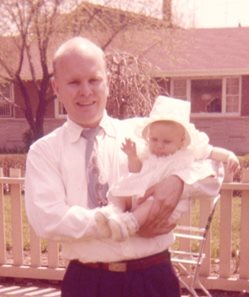Whenever I hear the phrase “death with dignity” – and I’ve been hearing it a lot lately as our country has debated euthanasia and assisted suicide – I think of my father’s dying.
We’ve been inviting Canadians to share their palliative care stories in connection with the launch of the Palliative Care Toolkit, a free, practical resource on serious illness (great for small group discussion) published by The Evangelical Fellowship of Canada. We’re honoured by the stories you’ve entrusted to us to share.
Whenever I hear the phrase “death with dignity” – and I’ve been hearing it a lot lately as our country has debated euthanasia and assisted suicide – I think of my father’s dying.

Patricia and her father walk down the aisle on her wedding day. Years later, she would experience the sadness and beauty of being part of the palliative care of her father.
It’s the worst kind of ache and exhaustion to provide around-the-clock care for someone you love, knowing they’re slipping away. There’s nothing you can do about it, except to offer ice chips when their mouth gets dry, cool cloths when their forehead gets clammy, and just enough morphine at just the right intervals to keep them comfortable.
But it’s also an immense privilege. And in helping to give that kind of care to my father, I witnessed the dignity that permeated the final days of his life.
It was 18 years ago – on February 29, 2000 – that my father breathed his last. He was 70, old enough to have lived a full life, but not so old that he’d lived all he wanted, or all that we wanted him to live. I felt a little bit cheated when he died.
I also felt gratitude. Dad had a good death, if death can ever be described that way – in his home, in a hospital bed in the living room, my mother at his side. She was holding his hand.
After almost five torturous months in hospital, battling to regain his health and strength following surgery for colon cancer, my dad learned his bones were full of the disease. Knowing there was no treatment that would make him well, he wanted to go home to die. So my mother, my three siblings and I became his care team 24/7, supported by extended family, visiting palliative care workers, VON nurses and his doctor.

Two weeks after being carried home by ambulance to live out whatever days he had left, he was gone.
Even now, heaviness settles in my chest whenever I recall that time, a heaviness that makes it just a little harder to breathe. But there is also a feeling of calm assurance. His dying had dignity. My family’s care for him – and the care of the team that supported us – helped that to happen.
Read a feature story on palliative care from a recent issue of Faith Today.